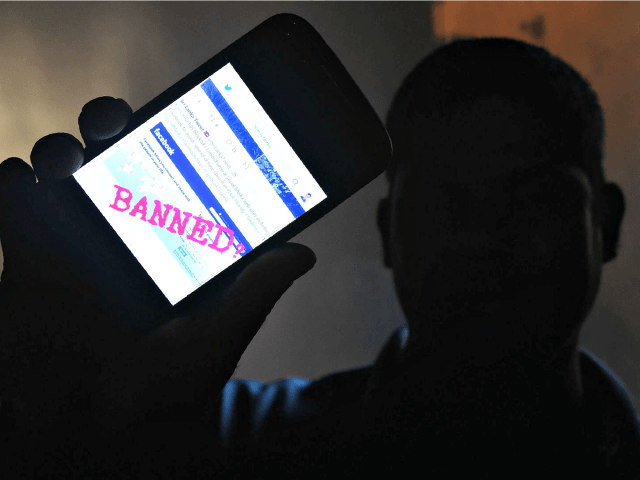Sen. Josh Hawley (R-MO) said Wednesday that Section 230 of the Communications Decency Act grants massive benefits to Google, Facebook, and Twitter, allowing them to censor without significant legal recourse.
Sen. Hawley unveiled the Ending Support for Internet Censorship Act on Wednesday, which would remove big tech’s immunity received under Section 230 unless they submit to an external audit that would prove that their algorithms and content-removal policies remain politically neutral. The bill only applies to large technology companies, not small and medium-sized startups.
A spokesperson for Sen. Hawley told Breitbart in a statement Wednesday that the senator’s legislation would stop “Big Tech’s assault on free speech.” The Hawley spokesperson said:
Senator Hawley’s bill is about stopping Big Tech’s assault on free speech. Google, Facebook and Twitter currently get a massive benefit from government that no other entity gets—immunity from liability. Senator Hawley’s bill says that if they want to keep that special benefit, they have to adhere to the First Amendment standard of no viewpoint discrimination. They are free to do whatever they wish, of course. If these companies prefer to advocate a particular viewpoint or penalize other views, they certainly can. But they shouldn’t get 230 immunity while doing it.
Sen. Hawley’s legislation has garnered significant attention. Donald Trump Jr., President Donald Trump’s son, shared the article.
GOP Sen. Josh Hawley takes aim at Big Tech's legal protection with new bill | Fox News https://t.co/A92xtWzqL3
— Donald Trump Jr. (@DonaldJTrumpJr) June 19, 2019
Andy Surabian, a former White House strategist, said that if Google, Facebook, and Twitter “want to be neutral platforms, they shouldn’t be allowed to ban people for political views, without being held legally accountable for doing so.”
Credit to @HawleyMO. Big Tech needs to decide if they want to be neutral platforms or publishers. They can't have it both ways. If they want to be neutral platforms, they shouldn't be allowed to ban people for political views, without being held legally accountable for doing so. https://t.co/xn9dPXCgWH
— Andrew Surabian (@Surabees) June 19, 2019
The Missouri Republican’s legislation also garnered vehement opposition from various parts of the Washington, DC-based conservative network.
Josh Hawley is selling his new legislation as a way to fight tech-company "bias" against Republicans. Don't believe him https://t.co/LwdoXdrh07 https://t.co/LwdoXdrh07
— Elizabeth Nolan Brown (@ENBrown) June 19, 2019
https://twitter.com/ZacharyGraves/status/1141392608981331968
We agree with Sen. @RonWyden on this! Government should not police speech online, and we urge lawmakers to oppose Sen. Hawley's bill. https://t.co/jWZznxRgwr
— AFP (@AFPhq) June 19, 2019
Sen. Hawley fought back against some criticisms of amending Section 230. Hawley noted that Congress amended Section 230 to make it easier to police sex trafficking on the Internet and that the legislation did not break the Internet.
Every time someone calls out Big Tech’s bad behavior, they cry about breaking the internet. A year ago,
Big Tech fought changes to CDA 230 that would stop sex trafficking. Now they want to keep discriminating against conservatives. Whatever makes them $$$— Josh Hawley (@HawleyMO) June 19, 2019
“Every time someone calls out Big Tech’s bad behavior, they cry about breaking the internet,” Hawley tweeted on Wednesday. “A year ago, Big Tech fought changes to CDA 230 that would stop sex trafficking. Now they want to keep discriminating against conservatives. Whatever makes them $$$.”
Sen. Ron Wyden (D-OR), one of the co-authors of Section 230, was one of the senators who voted against the bill that would make it easier to police sex trafficking on the Internet.
Although many conservatives sided with Sen. Wyden on Section 230, believing that Hawley’s bill would police free speech, Sen. Wyden said that Section 230 would allow social media companies to better crack down on alleged hate speech.
Wyden wrote in May that he wrote that part of the Communications Decency Act so that tech companies can take down “bad actors” without accruing lawsuits, and he suggested that social media platforms need to do more to weed out “hate.” The Oregon Democrat tweeted out this sentiment in the context of Facebook banning Alex Jones, Milo Yiannopoulos, and Laura Loomer – all prominent right-wing personalities.
I wrote Section 230 so Facebook and other companies can take down bad actors without being saddled with frivolous lawsuits. Platforms need to be much more vigilant about weeding out hate. This is a start. https://t.co/Zgl6JMmGpF
— Ron Wyden (@RonWyden) May 2, 2019
Sen. Hawley has continued to rail against big tech’s censorship of conservative and alternative viewpoints, chiding the social media companies’ secretive process to censor conservatives.
The senator continued, “There’s a growing list of evidence that shows big tech companies making editorial decisions to censor viewpoints they disagree with. Even worse, the entire process is shrouded in secrecy because these companies refuse to make their protocols public.”
Sean Moran is a congressional reporter for Breitbart News. Follow him on Twitter @SeanMoran3.

COMMENTS
Please let us know if you're having issues with commenting.